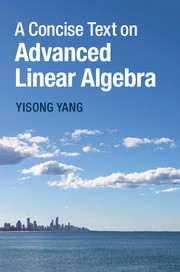Book contents
- Frontmatter
- Dedication
- Contents
- Preface
- Notation and convention
- 1 Vector spaces
- 2 Linear mappings
- 3 Determinants
- 4 Scalar products
- 5 Real quadratic forms and self-adjoint mappings
- 6 Complex quadratic forms and self-adjoint mappings
- 7 Jordan decomposition
- 8 Selected topics
- 9 Excursion: Quantum mechanics in a nutshell
- Solutions to selected exercises
- Bibliographic notes
- References
- Index
8 - Selected topics
Published online by Cambridge University Press: 18 December 2014
- Frontmatter
- Dedication
- Contents
- Preface
- Notation and convention
- 1 Vector spaces
- 2 Linear mappings
- 3 Determinants
- 4 Scalar products
- 5 Real quadratic forms and self-adjoint mappings
- 6 Complex quadratic forms and self-adjoint mappings
- 7 Jordan decomposition
- 8 Selected topics
- 9 Excursion: Quantum mechanics in a nutshell
- Solutions to selected exercises
- Bibliographic notes
- References
- Index
Summary
In this chapter we present a few selected subjects that are important in applications as well, but are not usually included in a standard linear algebra course. These subjects may serve as supplemental or extracurricular materials. The first subject is the Schur decomposition theorem, the second is about the classification of skewsymmetric bilinear forms, the third is the Perron–Frobenius theorem for positive matrices, and the fourth concerns the Markov or stochastic matrices.
Schur decomposition
In this section we establish the Schur decomposition theorem, which serves as a useful complement to the Jordan decomposition theorem and renders further insight and fresh angles into various subjects, such as the spectral structures of normal mappings and self-adjoint mappings, already covered.
Theorem 8.1Let U be a finite-dimensional complex vector space with a positive definite scalar product and T ∈ L(U). There is an orthonormal basis B = {u1, …, un} of U such that the matrix representation of T with respect to B is upper triangular. That is,
for some bij ∈ ℂ, i = 1, …, j, j = 1, …, n. In particular, the diagonal entries b11, …, bnn of the upper triangular matrix B = (bij) ∈ ℂ(n, n) are the eigenvalues of T, which are not necessarily distinct.
Proof We prove the theorem by induction on dim(U).
When dim(U) = 1, there is nothing to show.
Assume that the theorem holds when dim(U) = n − 1 ≥ 1.
We proceed to establish the theorem when dim(U) = n ≥ 2.
Let w be an eigenvector of T′ associated with the eigenvalue λ and consider
V = (Span{w})⊥.
We assert that V is invariant under T.
Information
- Type
- Chapter
- Information
- A Concise Text on Advanced Linear Algebra , pp. 226 - 247Publisher: Cambridge University PressPrint publication year: 2014
